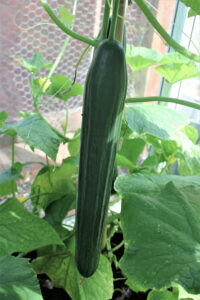Once tomatoes have set their fourth or fifth truss of fruit, cut off the main stem one leaf above the terminal truss, so the moisture and nutrients are focussed on swelling and ripening the fruit. Tap the open flowers around mid-day when the pollen is dry to encourage further pollination and tie the stems to canes or supporting string as they grow but not too tightly so there is room for the stems to swell.
In southern Britain and in sheltered spots in the garden, make a last sowing of runner and French beans indoors for early autumn cropping. You can also sow basil, coriander, dill, and Florence fennel in pots or modules for planting outdoors – basil can also be planted in the greenhouse border.
Keep twining cucumber stems round their supports and cut back the side shoots two leaves beyond the flowers and fruits, to increase airflow and reduce chances of mildew – keeping foliage dry, the plants well-watered and mulching also reduces the risk as do resistant varieties like ‘Carmen’, ‘Passandra’ and ‘Bella’. Harvest cucumbers when fruits are about 30cm long and water with high potash fertilizer to encourage further fruiting.

Plant invigorator spray developed by a commercial Tomato grower and based on organic soap, controls a wide range of pest species including Whitefly, Spider Mite and Mealybug plus mildew and other fungal problems, it is also a useful foliar feed, is biodegradable, non-toxic and there is no need to wait between spraying and harvest. It is an invaluable addition to a greenhouse gardeners’ armoury.
Keep the greenhouse free of damaged or diseased material and sweep the paths as plant debris often harbours pests and diseases. Make this part of your daily routine, if you can.
Move citrus plants outdoors in a sheltered sunny spot, ideally against a wall. (You can do this earlier during good summers) Mist leaves early in the morning, water using tepid water but do not let the base of the pot stand in water. Feed according to the manufacturer’s instructions with citrus summer feed to ensure good flowering and fruiting bring them back into the glasshouse by early September to overwinter.
Feed and water container plants with tepid water. Check if they need watering by sticking your finger into the of the compost, if it is free of compost particles when you pull it out then the plant needs watering, if there are particles sticking to your finger, it doesn’t. It’s also helpful to learn how to judge this by assessing the weight of the pot when the compost is wet and dry. When watering always give plants a thorough soak; a light sprinkling encourages roots to the surface where they are more susceptible to drought.
Melons should be pinched out beyond the fifth leaf, retaining the four strongest stems. Pollinate those with the swelling behind the flower (female) with those that don’t, (males) This year I am growing ‘Emir’ it has an RHS Award of Merit and is fast growing and cold tolerant, perfect for a British summer, inside and out. Happy gardening. Matt


